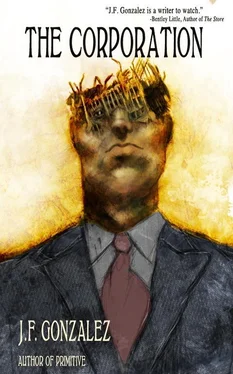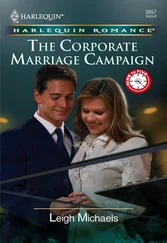“What are these methods?” Michelle asked.
“Complete subservience to the corporate cause of your employer in order to feed it and Corporate Financial.”
“But how does that happen !” Michelle was trying to understand what Rachel and Alan were telling her but she was having a hard time with it. In a way, she did understand some of what they were saying. So many people did what their employers told them to do, no questions asked. Other people (a lot of people, really) had no sense of self-worth or identity and became subservient to their employer as a way of feeling good about themselves. Michelle had never been like this, even when she was working for All Nation. “I understand a lot of people don’t have a mind of their own and—”
“That’s how they do it,” Alan said quickly. “The first converts are those who can’t think outside the box. They target the emotionally weak and vulnerable, those with no sense of self-worth or identity. They also use methods of psychological warfare to get those that are more strong-willed—they’ll spy on employees, keep track of their personal life, find a way to blackmail them.”
“How can they do that? They can’t spy on people!”
“Yes they can.” Alan took a drag on his cigarette. “The Fourth Amendment protects individuals against the government. It doesn’t protect them against other individuals, especially individuals who form a corporate governing body. In the late 1800’s, Congress made various rulings that, in essence, defined corporations. Corporations were given the same rights and status as people, with all the same legal rights as you or I. To make a long story short, after the Civil War, the thirteenth through the fifteenth amendments were ratified to provide full constitutional protections and due process of law to the newly freed slaves in the United States. At the same time, there was a movement against Paine and Jefferson’s rulings almost a hundred years earlier that severely regulated corporations. States had made it illegal for corporations to participate in the political process, made it illegal to lie about their products, and required their books and processes always be open and available to government regulators. They also made laws that gave State and Federal government officials rights to inspect companies and investigate them when they caused pollution, harmed workers, or created hazards for communities. Needless to say, those laws were a constant thorn in the side of many corporations, and with the passage of the 14 thamendment, the owners of what were then America’s largest and most powerful corporations—the railroads—figured they’d finally found a way to reverse Paine’s logic and no longer have to answer to ‘we, the people’.”
Alan paused, his eyes seeming to seek a reaction from Michelle, then he went on. “They would claim a corporation is a person . They would claim that for legal purposes, the certificate of incorporation declares the legal birth of a new person, who should have the full protections the voters have under the bill of rights. Attorneys for railroads filed suits against local and state governments on the issue. This went on for over twenty years, and they hammered the same issue. Finally, four different cases reached the Supreme Court in 1886 when a Recorder of the court wrote into his personal commentary of the case that the Chief Justice said that all the Justices agreed that corporations are persons. This was clearly a clerical error on the Recorder’s part. This headnote had no legal standing, yet it was taken by generations of jurists, including the Supreme Court, who followed and read the headnote but not the decision. The ironic thing about this is the Recorder in this case knew the Court had not ruled on this issue. Since then, Corporations have used this case—Santa Clara County vs. The Union Pacific Railroad—to press their cause further and as a result, these non-living, non-breathing persons are now fully entitled to the full protections that shield people against abuse from government.”
Michelle sputtered. “That’s—” Insane was the first word that popped into her mind.
“A few of the largest corporations referenced Santa Clara and successfully claimed the protection of the First Amendment, then lobbied Congress and the FCC so they could take control of our media. Once that was done, they claimed their First Amendment free speech rights to tell us whatever serves their interest and call it news without consideration of its truthfulness or having to worry about giving fair and equal time to other viewpoints. They claim the protection of the Fourth Amendment so they can prevent the EPA and OSHA from inspecting factories or environmental or labor violations without first obtaining the corporation’s permission. They also now have the protection of the Fifth Amendment, and the Fourteenth Amendment. Companies can delve into your personal records, monitor your private email—even from ISPs you maintain outside of work—dig up a lot of information about you that does not relate to your job and they can do it legally.”
“Furthermore, they’ll play hardball with you,” Rachel said. “They’ll threaten your loved ones, mess up your financial records, do anything to get you to toe the line.”
“But that’s harassment!” Michelle protested.
“And they’re very good at it,” Alan said. He regarded her calmly. “Look at it this way. You’re strong-willed, very independent, can think for yourself. Suppose you were a single mother and left your child at a combined school/day care center during the day while you worked. The daycare in question closes at six and you’re always able to get your child by five-thirty. Ninety percent of all employers realize their employees have children and must make arrangements for child care, plus most employers operate from eight to five anyway. Now suppose you’re suddenly told that your workload or your projects are so important that you have to stay at the office until your tasks are done for the day, even if it means missing the deadline for picking your child up. You know you can’t do that: the daycare center will dock you five dollars for every minute you’re late. And you don’t want to do that anyway; your child will grow worried that you haven’t picked him or her up, they’ll get very upset. So you do what any parent will do who puts their child first, and you leave when you usually leave. Maybe you leave a little late, but you still make sure you have enough time to get your child. Only your employer doesn’t like this. They start guilt-tripping you, questioning your loyalty to your job and your profession. You stand your ground. Later that day, they tell you some very personal things about your child, things only you can know. This is delivered as a veiled threat, that if you don’t toe the line at work, your child will be hurt or killed.”
“That’s when it would stop,” Michelle said, the thought of this scenario chilling her blood. “I’d tell them to fuck off and walk out of there.”
“That’s what you would do,” Alan said. “But there are people in different situations that wouldn’t do that at first. Maybe they’d be under financial pressure, scared to do anything. Some might try to fight back, but they’d be dealt with severely.”
“You make these people sound like the mob,” Michelle said.
“That’s because they behave that way,” Alan said. “I’m not saying they are the mob, but they employ those same methods.”
“But why would they do this? Companies that would treat their employees that way are only going to lose them and—”
“They treat their employees that way because they can ,” Rachel said. She took a drag on her cigarette, her features stern. “That’s what we’re trying to get through to you. They can do this because they’ve been doing it time and time again. They don’t give a shit about the people who work for them. Their entire goal, their mission , is to make as much money as possible. When they first started such strong-arm tactics, there were people just like you that filed grievances, got lawyers and sued them, the whole nine yards. The courts always sided with the company, especially if it was a company with Corporate Financial on their side.”
Читать дальше












